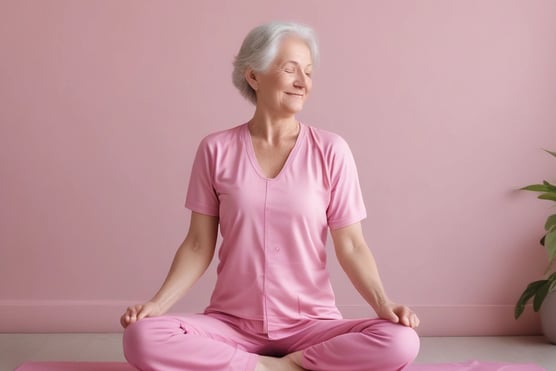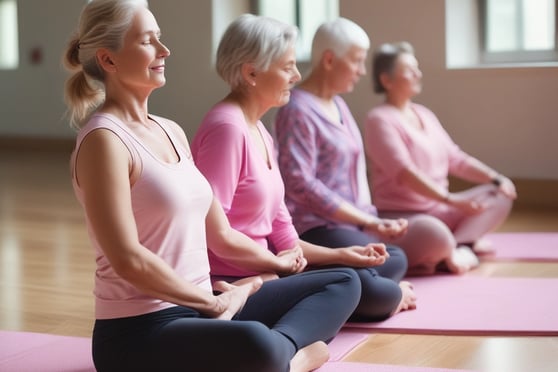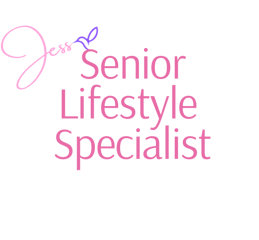Aromatherapy: A Gentle Touch for Holistic Healing
At Senior Lifestyle Specialist, we embrace a holistic care model that recognizes the interconnectedness of mind, body, and spirit. Aromatherapy, the therapeutic use of essential oils, is a valuable modality that we integrate into our services to enhance well-being, particularly for clients navigating the complexities of dementia and stroke recovery.
The Holistic Home Care Advantage
Our approach to holistic home care at Senior Lifestyle Specialist emphasizes:
Person-Centered Care: We tailor our care to the individual's needs, preferences, and life experiences. Aromatherapy is no exception; we carefully select and apply oils based on each client's unique situation and sensitivities.
Non-Pharmacological Approaches: We prioritize non-drug interventions whenever appropriate to manage symptoms and promote comfort. Aromatherapy offers a gentle and often effective way to address various challenges without the potential side effects of some medications.
Sensory Stimulation: We understand the power of sensory input in enhancing well-being. Aromatherapy engages the sense of smell, which can evoke powerful memories, emotions, and physiological responses.
Emotional and Mental Well-being: We focus on supporting emotional and mental health, recognizing the significant impact of these factors on overall recovery and quality of life.
Aromatherapy in Dementia Care
For individuals living with dementia, aromatherapy can offer a range of benefits:
Reducing Agitation and Anxiety: Certain essential oils, like lavender and chamomile, have calming properties that can help manage restlessness, anxiety, and agitation, common behavioral symptoms of dementia.
Improving Sleep Quality: Sleep disturbances are frequent in dementia. Aromatherapy with lavender or other relaxing oils can promote restful sleep.
Enhancing Mood: The pleasant aromas of essential oils can uplift mood, reduce feelings of depression, and encourage positive emotions.
Stimulating Memory and Cognition: Some essential oils, such as rosemary and peppermint, may help improve alertness, focus, and memory recall. The olfactory system is closely linked to brain areas involved in memory and emotion.
Aromatherapy in Stroke Recovery
Aromatherapy can also be a valuable complementary therapy for stroke recovery:
Promoting Relaxation and Stress Reduction: Stroke recovery can be a stressful process. Aromatherapy can help reduce anxiety and promote relaxation, which in turn supports the healing process.
Improving Mood and Motivation: The uplifting scents of certain essential oils can help combat post-stroke depression and increase motivation for rehabilitation.
Supporting Sleep: Adequate sleep is crucial for brain recovery. Aromatherapy can help you achieve restful sleep.
Pain Management: Some essential oils may help alleviate pain, which can be a factor in stroke recovery.
Benefits for Senior Lifestyle Specialist Clients
By integrating aromatherapy into our care plans, Senior Lifestyle Specialist provides clients with:
Personalized Aromatherapy Plans: Our care managers, working in collaboration with trained caregivers, develop individualized aromatherapy protocols tailored to each client's specific needs and preferences.
Safe and Effective Application: We prioritize safety and use appropriate dilution methods and application techniques, such as diffusion and gentle massage with carrier oils.
Enhanced Comfort and Well-being: Aromatherapy contributes to a more comfortable, relaxed, and emotionally balanced experience for our clients.
Complementary Approach: Aromatherapy is used in conjunction with other holistic care services, providing a comprehensive and integrated approach to health.
Examples of Aromatherapy Applications:
Diffusing lavender oil in the evening to promote sleep.
Using peppermint oil to increase alertness during the day.
Applying a blend of calming oils during a gentle massage can reduce anxiety.
At Senior Lifestyle Specialist, aromatherapy is a powerful tool that enhances our holistic care and improves the lives of our clients.


Music Therapy: A Powerful Tool


At Senior Lifestyle Specialist, we genuinely believe in the power of finding inner peace and calm. That's why we use mindfulness and meditation to help our clients feel better overall. These aren't just fancy words – they're ways to take care of yourself, like simple relaxation, guided exercises, and sometimes even working with trained professionals for hypnosis. We find these things can make a big difference, especially for those dealing with dementia or recovering from a stroke.
Why Focusing on Mind and Body Matters
We see the whole person – mind, body, and spirit – as connected. Mindfulness and meditation fit right into this way of thinking because they help in so many ways:
Feeling less stressed: These practices can help calm your nerves and promote relaxation.
Handling Emotions Better: They make you more aware of how you're feeling and help you manage those feelings.
Thinking More Clearly: They can improve your focus and memory.
Just Feeling Good: They help you feel more peaceful, like you have a purpose, and connected to others.
Helping Those with Dementia
For people living with dementia, we adapt mindfulness and meditation to fit their needs. It can help:
Reduce Restlessness: Guided relaxation can soothe agitation and bring a sense of calm.
Ease Anxiety and Sadness: Focusing on the present moment can lighten the mood.
Improve Sleep: Relaxation can lead to better sleep.
Connect Better: It helps caregivers listen and connect more deeply.
Stay Connected Inside: Even in later stages, it can help people stay connected to their inner selves.
Aiding Stroke Recovery
These practices are also helpful for people recovering from a stroke:
Rebuilding Thinking Skills: Meditation can help with attention, focus, and memory.
Handling Emotions: It helps manage the sadness and worry that can come after a stroke.
Managing Pain: Relaxation can make pain feel less intense.
Lowering stress is essential for healing.
How This Helps Our Clients
At Senior Lifestyle Specialist, using mindfulness and meditation means:
Tailored to You: We adapt things to fit your abilities and preferences.
More Than Medicine: These can be used instead of or alongside medicine, which may result in fewer side effects.
Taking Charge: We provide you with tools to help you take an active role in your care.
Better Life Quality: It enables you to feel more peaceful and fulfilled.
Complete Care: These services complement our other offerings to provide a well-rounded approach to your health.
Examples of What We Do:
Guided Meditation: Listening to someone lead you through relaxation.
Focusing on Breath: Paying attention to your breathing to stay in the moment.
Relaxation exercises include tensing and releasing muscles or imagining peaceful scenes.
Simple Meditation: Easy meditation for those with thinking challenges.
Hypnosis (with Experts): Sometimes, hypnosis can help manage pain or anxiety when performed by trained professionals.
Self-Care: Encouraging things that make you feel good, like gentle walks or being creative.
At Senior Lifestyle Specialist, finding inner peace is key to feeling well. By incorporating these practices, we help our clients lead happier, more balanced lives, regardless of what challenges they face.
Mindfulness and Meditation:
Cultivating Inner Peace and Well-being at Senior Lifestyle Specialist
At Senior Lifestyle Specialist, we deeply value the power of mindfulness and meditation to promote holistic well-being. These practices, encompassing self-care techniques, hypnosis, and guided meditation, are integral to our approach, offering profound benefits for our clients, particularly those navigating dementia and stroke recovery.
The Holistic Home Care Advantage
Our holistic philosophy recognizes the interconnectedness of mind, body, and spirit. Mindfulness and meditation align perfectly with this by:
Reducing Stress and Anxiety: These practices calm the nervous system and promote relaxation.
Improving Emotional Regulation: They enhance self-awareness and help manage emotions.
Enhancing Cognitive Function: They can improve attention, focus, and memory.
Promoting Overall Well-being: They cultivate a sense of inner peace, purpose, and connection.
Mindfulness and Meditation for Dementia Care
For individuals living with dementia, mindfulness and meditation (in adapted forms) can offer significant benefits:
Managing Agitation and Restlessness: Guided meditation and relaxation techniques can help soothe agitation and promote a sense of calm.
Reducing Anxiety and Depression: Mindfulness practices, such as focusing on the present moment, can alleviate anxiety and improve mood.
Improving Sleep Quality: Relaxation techniques can promote better sleep and reduce sleep disturbances.
Enhancing Communication: Mindfulness can improve the caregiver's ability to listen and connect with the individual.
Promoting Self-Awareness: Even in later stages, adapted practices can help individuals remain connected to their inner selves.
Mindfulness and Meditation for Stroke Recovery
These practices can also be valuable tools in stroke recovery:
Cognitive Rehabilitation: Meditation and mindfulness can enhance attention, focus, and memory, supporting cognitive recovery.
Emotional Rehabilitation: They can help manage post-stroke depression and anxiety, which are common and can hinder recovery.
Pain Management: Relaxation techniques can reduce pain perception and promote comfort.
Stress Reduction: Managing stress is crucial for overall recovery and preventing further complications.
How These Practices Benefit Senior Lifestyle Specialist Clients
By incorporating mindfulness and meditation, Senior Lifestyle Specialist provides clients with:
Personalized Approaches: Techniques are adapted to the individual's abilities, preferences, and needs.
Non-pharmacological options: These practices can be used alongside or as alternatives to medication, reducing the potential side effects.
Empowerment and Self-Management: They provide clients with tools to participate in their care and well-being.
Improved Quality of Life: They contribute to a more peaceful, fulfilling, and connected life.
Comprehensive Care: These practices complement our other holistic services, creating a well-rounded approach to health.
Examples of Mindfulness and Meditation Practices:
Guided Meditation: Using audio or verbal guidance to focus attention and promote relaxation.
Mindful Breathing: Focusing on the breath to anchor oneself in the present moment.
Relaxation Techniques: Progressive muscle relaxation, visualization, and other methods to reduce tension.
Adapted Meditation: Simplified meditation practices tailored to individuals with cognitive limitations.
Hypnosis (with trained professionals): In some cases, hypnosis may be used to address specific needs, such as pain management or anxiety, with the guidance of a qualified practitioner.
Self-Care Practices: Encouraging activities that promote mindfulness and well-being, such as gentle stretching, nature walks, or creative expression.
At Senior Lifestyle Specialist, cultivating inner peace and mindfulness is essential for overall health and well-being. By integrating these practices into our holistic care, we empower our clients to lead more balanced and fulfilling lives, regardless of the challenges they face.
Finding Peace and Well-being


Gentle Exercise: Restorative and Chair Yoga


At Senior Lifestyle Specialist, we understand that physical activity is a cornerstone of holistic health, especially for our senior clients. We incorporate gentle exercise modalities, such as restorative yoga and chair yoga, into our care plans to promote well-being, enhance recovery, and improve quality of life.
The Holistic Home Care Advantage
Our holistic approach recognizes the interconnectedness of mind, body, and spirit. Gentle exercise, such as restorative and chair yoga, aligns with this philosophy by:
Promoting Physical Health: Improving strength, flexibility, balance, and circulation.
Enhancing Mental Clarity: Reducing stress, improving mood, and promoting relaxation.
Fostering Social Connection: Creating opportunities for interaction and engagement.
Supporting Emotional Well-being: Cultivating a sense of calm, self-awareness, and inner peace.
Gentle Exercise for Dementia Care
For individuals living with dementia, restorative yoga and chair yoga offer significant benefits:
Reducing Agitation and Anxiety: Gentle movements, controlled breathing, and calming poses can help manage restlessness and promote relaxation.
Improving Mood and Sleep: These practices can help alleviate symptoms of depression and enhance the quality of sleep, both of which are common in dementia.
Maintaining Mobility and Function: Chair yoga helps maintain strength and flexibility, supporting independence in daily activities.
Enhancing Cognitive Function: Gentle movements and focus on breathing can improve attention and awareness.
Nonverbal Communication: Yoga can offer a form of nonverbal communication and emotional expression.


Gentle Exercise for Stroke Recovery
Restorative yoga and chair yoga can also be valuable components of stroke recovery programs:
Motor Rehabilitation: Chair yoga, in particular, can help improve motor control, coordination, and range of motion in affected limbs.
Balance and Stability: These practices can enhance balance and stability, reducing the risk of falls.
Reducing Spasticity: Gentle stretching and controlled movements can help alleviate muscle spasticity, a common side effect of a stroke.
Improving Circulation: Gentle exercise promotes blood flow, which is crucial for healing and recovery.
Emotional Support: Yoga's emphasis on relaxation and mindfulness can help manage post-stroke depression and anxiety.
How These Practices Benefit Senior Lifestyle Specialist Clients
By incorporating restorative yoga and chair yoga, Senior Lifestyle Specialist provides clients with:
Personalized Programs: Exercise routines are tailored to the individual's abilities, limitations, and preferences, ensuring safety and enjoyment.
Safe and Accessible Options: These practices are adaptable and can be performed in various settings, including the client's home, with minimal equipment.
Increased Independence: Gentle exercise can help clients maintain their independence in daily living activities for a longer period.
Improved Overall Quality of Life: By addressing physical, mental, and emotional needs, these practices contribute to a more fulfilling and enjoyable life.
Complementary Therapy: Gentle exercise complements our other holistic care services and can be integrated with traditional medical treatments.
Examples of Gentle Exercise Practices:
Chair Yoga: Modified yoga poses performed while seated in a chair, focusing on gentle stretching, breathing exercises, and balance work.
Restorative Yoga: Passive poses held for extended periods with the support of props like blankets, pillows, and bolsters to promote deep relaxation and stress relief.
Gentle Stretching: Simple stretches to improve flexibility and range of motion.
Mindful Movement: Activities like tai chi or qigong, which emphasize slow, controlled movements and focus on breath.
At Senior Lifestyle Specialist, we are committed to providing holistic care that empowers our clients to live their best lives. Gentle exercise modalities, such as restorative yoga and chair yoga, are valuable tools in achieving this goal.
Traditional Homecare vs. Senior Lifestyle Specialist: A Holistic Approach
Choosing the right homecare for your loved one is a significant decision. While traditional homecare agencies provide valuable support, Senior Lifestyle Specialist offers a distinct advantage through our deeply ingrained holistic philosophy, particularly tailored for the Country Place and The Lakes at Country Place communities. Here's a comparison:
Feature
Traditional Homecare Agencies
Senior Lifestyle Specialist (Holistic Focus)
Core Philosophy
Primarily focused on addressing physical and practical needs (ADLs).
Emphasizes the interconnectedness of mind, body, and spirit, addressing physical, emotional, cognitive, social, and even subtle energetic well-being.
Service Approach
Often task-oriented, with caregivers following a pre-determined schedule of activities.
Person-centered and adaptable, care plans are tailored to individual preferences, history, and holistic needs, incorporating therapeutic modalities.
Caregiver Training
Standard training in basic caregiving skills, personal hygiene, and safety protocols.
In addition to standard training, our caregivers receive specialized training in holistic modalities such as Touch Therapy, Music Therapy, Aromatherapy, and gentle exercise techniques. Our Country Place drop-in service is staffed by local healthcare professionals.
Service Flexibility
Typically require minimum visit durations (e.g., 2-4 hours).
Offers flexible options, including traditional longer visits and our exclusive 24/7 emergency drop-in service specifically for Country Place residents, providing support for even short, immediate needs.
Holistic Therapies
Rarely integrated into standard care plans.
Actively integrates holistic therapies as integral components of care, personalized to the client's needs and preferences, promoting relaxation, reducing anxiety, stimulating memory, and encouraging gentle movement.
Specialized Expertise
May have caregivers with experience in specific conditions.
Led by a professional with over 40 years of healthcare experience, including hospice and homecare, and certifications as a Certified Dementia Practitioner, Certified Hypnotist, Certified Senior Advisor, and Nutritionist, bringing a unique depth of knowledge.
Community Focus
Service areas are typically broad and not necessarily community-specific.
Deeply rooted in the Country Place and The Lakes at Country Place community. Our emergency drop-in service is exclusively for residents and staffed by their neighbors, fostering trust and familiarity.
Emergency Support
May offer on-call services, but often with response time variability and minimum visit requirements.
Provides an exclusive 24/7 emergency on-call drop-in service for Country Place residents, ensuring rapid response from familiar faces within the neighborhood. Remote monitoring options are also available.
Nutrition Focus
May address basic dietary needs.
Offers guidance from a certified Nutritionist, incorporating nutritional considerations into care plans to support overall health and well-being.
Focus on Well-being
Primarily focuses on physical comfort and safety.
Aims to enhance overall well-being, addressing emotional, cognitive, and spiritual needs alongside physical comfort, promoting a greater sense of purpose and quality of life.
Export to Sheets
In essence, while traditional homecare agencies provide essential support, Senior Lifestyle Specialist offers a more comprehensive and enriching care experience. We go beyond the basics to nurture the whole person, leveraging the power of holistic therapies and a strong community connection, particularly within Country Place. Our flexible service options, including our unique emergency drop-in for neighbors, ensure that you receive the precise support you need, when you need it most, delivered with expertise and genuine care.
Stay Vibrant, Stay Home.
jess@slspearland.com
© 2025. All rights reserved.


Jess Taylor, CHt, CDP, Herbalist
Founder of SLS Pearland
With over 40 years in healthcare, Jess blends holistic home care with advanced dementia support using tools like hypnosis, herbal medicine, and mindfulness. A proud Country Place neighbor, she’s reimagining elder care with compassion, curiosity, and joy.
Senior Lifestyle Specialist – SLS Pearland
📍 Serving Country Place & Lakes at Country Place
📞 346-498*7893
✉️ admin@slspearland.com
🌐 www.slspearland.com
💖 @SeniorLifestylespecialist
